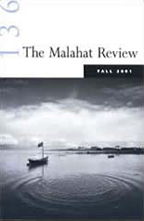Issues
Our Back Pages
Issue 136
Issue Date: Fall 2001
Editor: Marlene Cookshaw
Pages: 128
Number of contributors: 32
Buy Issue 136: Print Edition

The fall 2001 issue is thick with poetry, rich with poetry, greedy with poetry, gluttonous, swinish, gormandized with poetry. There are poems by Eve Joseph, Crispin Elsted, Derk Wynand, Jan Zwicky, M. Travis Lane, and Iain Higgins. Michael Crummy’s two poems are dark and beautiful in an east-coast way. “Darkness Turns” begins with a reflection at “an old woman’s deathbed” and moves from end of life into winter metaphor—“the driveway muscled clean,” and a poinsettia plant stressed in a closet to strain “the broad green leaves,” although no one recalls “why the darkness turns / the green poinsettia leaves red.” His other poem, “Bushed” is about the experience of the Northern Ontario landscape. “The woods whisper on / for miles,” he says, “but it feels like depth not distance.”
“And If She Moved like Jazz Trumpets” by M.E. Mutch is a wonderful exercise in sound and rhythm:
and if she moved like jazz trumpets
stuttering hips, scatting
if she moved like barking dogs
all tied and wild
and if she moved like a steel drum
rolling would you think yourself
any less able to
wickedness, subterfuge….
Her poem picks up speed as it moves along and asks to be read aloud at least twice, maybe three times.
Sue Wheeler is a poet I’ve admired for many years. She has a passion for environmental issues in the way Mary Oliver does. In this Malahat, a poem called “Who I Am” plays with the apology familiar to west-coast people. She says, “This is the time of year I have to hide / from friends in the eastern provinces,” because they tire of hearing that our “snowdrops / have already faded, or how the forsythia / shouts with a thousand yellow voices.” By the end of the poem, she has examined herself and the world, and wonders, on her knees in the yard, if what she is doing is “weeding — / or is it prayer? Prayer, and a fit of sneezing.”
Of course, there is fiction too. The issue opens with two stories by Simon Korner. The fiction board must have been feeling particularly generous that day because it is rare as astatine that one writer would have two stories included. They are connected stories from a larger project of linked pieces. You be the judge of their merit, but I plan to have a look to see if I can find the book in which these stories ended up.
Finally, there is a story called “Being Famous” by Leah Postman. It’s a story that is full of delights, bowls of cereal, TV stardom, and stolen clothing, and it was selected as a finalist for the prestigious 2003 Journey Prize.
— Jay Ruzesky









